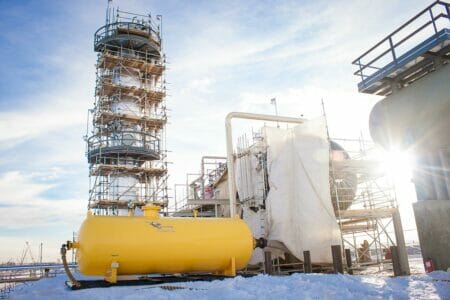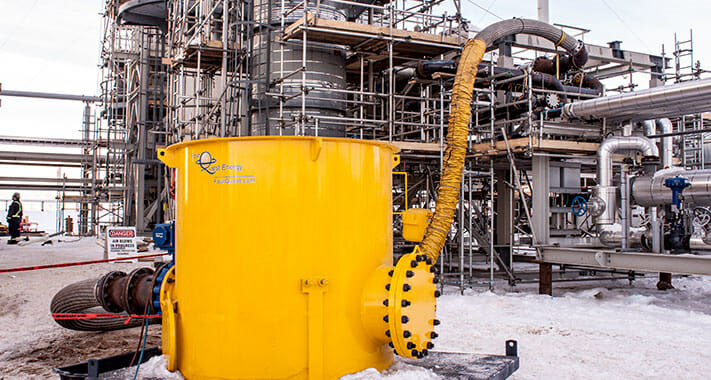Engineered air blowing is an efficient way to remove construction debris, loose rust, liquids, and other contaminants from process piping.
Every air blow procedure is specifically engineered for the individual system being cleaned. This approach provides numerous benefits for our clients, including time effective execution by efficiently sequencing the blows, thorough cleaning guaranteed by achieving an optimal cleaning force of at least 1.5 (CFR > 1.5), and safe field execution through following the best industry practices.
Decompression air blowing involves pressurizing the system or an additional volume to a predetermined and engineered pressure so that operational forces during the process will be exceeded. Once the predetermined pressure has been reached, the pressurized portion of the system is decompressed into a specialized collection and noise reducing receiver. For continuous air blowing, the system is subjected to a continuous stream of air at a predetermined and engineered flow rate until the client’s desired cleanliness specifications have been met.
Compressed Air Services
Compressed air can be used in a variety of applications within the energy and petrochemical industries. Applications include air blowing for the cleaning and commissioning of new facilities or build systems, drying pipelines and systems following hydro tests, pressure and leak testing, and heating and cooling of systems.
Drying pipelines and systems:
Compressed air can be used for system dehydrating and dewatering. Following completion of a successful hydro test, pipelines are dewatered and prepared for use. Gas and finished product pipelines must be cleaned and dried prior to the introduction of the product to be transported. Compressor spreads can provide large volumes of -60˚C dew point air, which, combined with foam pigs and brush pigs can clean and dry pipelines to a very high standard. This service can be used in conjunction with air blowing.
Pneumatic testing and leak testing:
Compressed air can be used to provide pneumatic testing on newly constructed or modified systems. FourQuest Energy also provides stored energy calculations for pneumatic tests. For example, hydrogen reformers must be tested prior to operation, and stored energy calculations can be used to determine safe distance limits during the test.
Pneumatic testing is used when a hydro-test fluid may place too much weight on the piping or damage a coating. It is also used for boiler tubes that must remain dry prior to operation where it would be impossible to drain any liquid after a conventional hydro-test.
Compressed air can also be used for checking a system’s integrity by confirming the absence of leaks and passing valves. Integrity testing can be done in conjunction with air blowing. During the pressurization of the system for decompression blowing, the system can be observed for leaks or valve passing.
System heating and cooling:
Compressed air can be used for system heating and cooling. For heating, air heated during the compression process is used to heat the system to temperatures up to 120°C. By heating the system, it can be tested for expansion ability and any faults can be identified and repaired prior to operation. Compressed air heating can also be used for preheating the system or vessels before operation.
Applications

- Removal of construction debris and velocity cleaning
- Pre-heating, heating, and cooling of process vessels, reactors, and systems.
- De-watering and Drying
- Pigging and Drying pipelines
- Pipeline Pre-packing
- Pneumatic Pressure Testing
- Leak Testing
- Pre-tensioning Pipelines

